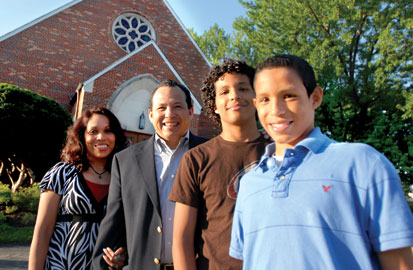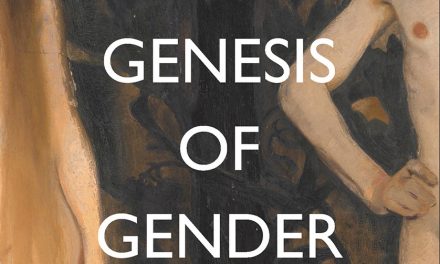Over at NCR, Joshua McElwee reported this week that two groups of German theologians answered the Vatican’s questions on “Pastoral Challenges of the Family in the Context of Evangelization.” The 17 signers “bluntly outlined” how most Europeans embrace different ways of living than the Church asks them to and articulate concerns about family and sexuality that differ from those of Church authorities. They “propose that the church adopt a whole new paradigm for its sexual teachings, based not on moral evaluations of individual sex acts but on the fragility of marriage and the vulnerability people experience in their sexuality.”
The theologians, including “some of Germany’s most respected Catholic academics,” are responding to questions sent from the Vatican’s Office for the Synod of Bishops. As Jason King wrote on our blog last fall, the Vatican has asked bishops to prepare for a 2014 synod on the family by using the questions to better understand how church teaching is received or not received. Some Catholic groups have written their own versions of the survey and encouraged their members to respond. The Bishops of England and Wales made the survey available on their website. At least 46 dioceses in the U.S. have sought responses to the survey in some way.
All of the questions essentially ask, “In those cases in which the Church’s teaching is known, is it accepted fully, or are there difficulties putting it into practice? If so, what are they?” The tone of the questions is sincere. The range of questions shows strong knowledge of pastoral situations in which Catholics in and outside the parish are unfamiliar with, struggle with, or ignore teachings on sex, cohabitation, marriage, annulment, divorce, same sex union, contraception, domestic church, and the spiritual depth of family life.
In the document obtained by NCR, the German bishops are suggesting an ethic for sex and marriage that has vulnerability and liberation at its core. According to McElwee‘s source, three dimensions are key: (1) Marriage as ” an institution that protects . . . fragility, not as an institution of obligation,” (2) A rejection of sexual violence and siding with “those who lose in relationships, the ones who are left and hurt to the core,” and (3) A focus on the complex nature of vulnerability, “The joy of intimacy can be experienced only when it is possible to be vulnerable without being violated.”
Clearly, the German Bishops hope for major changes, both in how the Church teaches about sex, marriage, and family, and in what it teaches. However, it is not at all clear that the bishops will be satisfied with the outcome of the synod.
Will most liberal Catholics? In an article in The Week, Damon Linker wonders if Catholics simply no longer care about Church teachings. He notes that after he wrote a piece the The New Republic contrasting the Pope’s rhetoric with his actions, liberal Catholics responded with a shrug. “It’s irrelevant. It’s a non-issue for Catholics,” one woman told him. Provocatively, Linker asks, if this is the new face of Catholicism in the U.S., “we appear to be left with a puzzle: When does a church without a doctrine cease to be a church at all?”
The challenge is real. Many older Catholics gave up on Church sexual teaching a long time ago and most younger believers can’t imagine taking the teaching seriously. Linker asks what Catholics want. I would argue that both doctrine and pastoral practice matter. My hope is that the witness of Pope Francis opens the hearts of the faithful, the surveys touch the hearts of the Bishops gathered at the synod, and the dialogue results in better teaching that more people care about and strive to live out.
The German theologians’ ethic of vulnerability and emancipation may not be all the Church needs to say about sex, marriage, and family, but surely, this is a good place to begin.





Julie–
This could be a VERY interesting year for those of us who do sexual ethics (and for Margaret Farley, whom, it might be argued, has already outlined a detailed sexual ethic that is about liberation and vulnerability).
Ross Douthat had a commentary on the Linker article: http://douthat.blogs.nytimes.com/2014/01/15/catholicism-and-cognitive-dissonance/?_php=true&_type=blogs&_php=true&_type=blogs&_r=1
in which he basically argues that a little “cognitive dissonance” between church teaching and actual practice is a good thing. But I think you are arguing that (for a long while) it’s not been a matter of cognitive dissonance but simple irrelevance. In Donna Freitas’ study, evangelicals were experiencing dissonance, whereas the Catholics just laughed and assumed the Church was irrelevant on this.
I think the whole conversation tends to ignore the privatization of sexuality. It’s not as if without sexual teachings Catholicism will become “a church without doctrine.” The issue is whether and how Church teaching will be understood in this area, and whether Catholic commitments (in significant ways) cut against the cultural grain. To me, this is why the social teachings and the sexual teachings must remain linked (though there are many ways to link them!), because of the frankly LIBERTARIAN bent of both of these in our culture, as opposed to the idea that both family and work/possessions are meant to be oriented toward the good of the Church and the world.